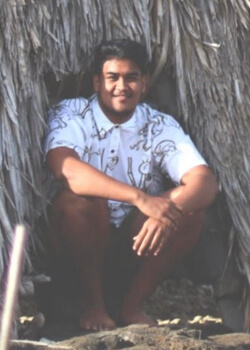[ad_1]
Sai-Dudoit performing “Kalamaʻula”
A multi-talented artist who can hit the actually excessive notes and play his personal accompaniment, University of Hawaiʻi at Mānoa pupil Heuaʻolu Sai-Dudoit isn’t any stranger to performing. He has been singing and enjoying the ʻukulele since he was 9 years outdated, and was just lately named the winner of the twentieth Annual Richard Hoʻopiʻi Leo Kiʻekiʻe Falsetto Contest.
The competition supplies a platform for preserving and perpetuating leo kiʻekiʻe (falsetto)—a method of music that entails singing at a vocal register greater than one’s ordinary vary. Sai-Dudoit was amongst 5 singers competing on this 12 months’s contest, which was held on Maui in September. Along with his first place title, he additionally obtained the particular Hawaiian Language and Musicality awards for his stellar efficiency of “Kalamaʻula.”
“It was a very good atmosphere for Hawaiian music,” stated Sai-Dudoit. “All of us get pleasure from Hawaiian music and we perceive the worth of it.”

Though this was his first time competing within the contest, Sai-Dudoit’s specialization in falsetto singing has been a few years within the making. His curiosity in falsetto started in fourth grade, when his substitute instructor who occurred to be the granddaughter of Genoa Keawe, a prolific Hawaiian falsetto singer, launched a Hawaiian falsetto track to the category. He continued singing and honing his craft within the years that adopted, and ultimately entered a broad singing competitors by Mana Maoli in 2021. This 12 months, on the advice of a vocal coach with Mana Maoli, he determined to enter the falsetto contest.
“There’s type of a purity, a clearness, to singing falsetto,” stated Sai-Dudoit. “For me, singing it feels good. It’s with the ability to categorical the phrases in the way in which the place individuals take discover of it and folks can get pleasure from it.”
Musical household lineage
Sai-Dudoit’s contest piece, “Kalamaʻula,” is a well known Hawaiian falsetto track that holds a particular household connection. It was written by Emma Kala Dudoit—his great-great-grandmother on his late father’s aspect. His Dudoit ʻohana additionally consists of ties to Horace Okay. Dudoit III, a founding member of Grammy-nominated group Hoʻokena. His mom’s aspect of the household has a musical lineage of its personal—his mom is the niece of Marlene Sai, a Hawaiʻi Academy of Recording Arts Lifetime Achievement Award profitable singer.
“Lots of people would select a track as a result of ‘this one sounds the perfect,’ or ‘this one is a typical,’ however with the one I picked, I’ve a connection to the track,” defined Sai-Dudoit. “I selected the track as a technique to honor that aspect of the household—my father and my great-great-grandmother.”
Along with rehearsing for his efficiency, Sai-Dudoit did diligent analysis within the month main as much as the competition. Since “Kalamaʻula” is an older track, most of the lyrics had been handed down vocally over time. With a view to uncover the unique, full lyrics, Sai-Dudoit rigorously examined a Hawaiian language newspaper from the early 1900s, which contained one of many earliest identified documentations of the track.
Hawaiian language meets enterprise
A 2021 graduate of Ke Kula ʻO Nāwahīokalaniʻōpuʻu immersion college on Hawaiʻi Island, Sai-Dudoit is now a second-year pupil majoring in Hawaiian language on the Kawaihuelani Center for Hawaiian Language in UH Mānoa’s Hawaiʻinuiākea School of Hawaiian Knowledge. Alongside his Hawaiian language research, he’s additionally taking programs on the Shidler College of Business.
In mixing Hawaiian language and enterprise, Sai-Dudoit hopes to reinstitute Hawaiian language making use of abilities gained by the examine of enterprise. Particularly, he’s within the music trade, and his enterprise research give him the entrepreneurial background to assist him achieve that enterprise.
“Hawaiian language…it’s enjoyable, it’s fascinating, it’s thought-provoking and I’m reintroducing the language and its qualities into enterprise—into a website the place it had as soon as flourished,” stated Sai-Dudoit.
—By Alisha Churma
[ad_2]
Source link
